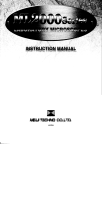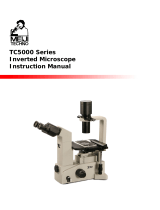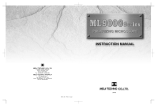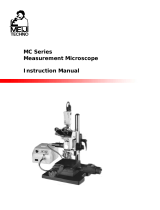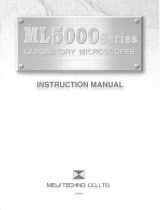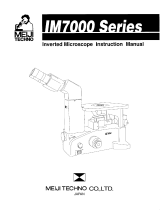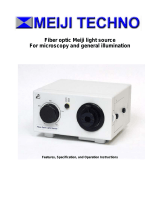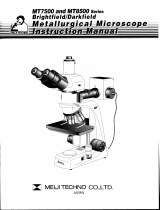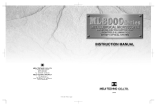Page is loading ...

Instruction on Centering Phase Contrast and Dispersion
Staining Condenser and Properly Achieving Koehler
illumination
For Meiji Techno America models MT6130, MT6120, MT6820, MT6830
Step 1: Need to align the ring slip when using dispersion staining objective. Please nd attached sim-
ple manual below
Step 2: When dispersion staining objective is used, only polarizer have to engage. Analyzer must re-
move from the slot.
(Also check the prepared sample slide if it was expired because that can change the colour as it use
reective index 1.550 that has an expiry date.)
How to get proper color with Chrysotile Sample
•Make sure rotatable swing out polarizer located on the lamp house is properly made the
orientation in cross polar.
•Make the condenser alignment.
Then you will get a right blue and magenta colour.
Note: Please note that stage is not centerable, instead of the stage use two short drivers to center the ob-
jective from the nosepiece. Strain free objective 10X in x position and objectives must install in centerable
nosepiece position.
Note: Please refer to the Section 1.0 to center the objectives and Section 2.0 to adjust the koehler light on the
next pages of this manual.

1.0 Centering the Objectives
When objectives are not centered, specimens may leave the eld of view when rotating the stage.
Perform the steps below if objectives are not centered properly:
1. Before starting, make sure that the 10X objective is installed in the xed hole of the nosepiece.
This is the position that does NOT have centering screws. All objectives will be adjusted against
the 10X position.
2. Make sure the Bertrand Lens, the analyzer and any other sliders are clear of the optical path
and the iris on the illuminator is open all the way.
3. Use a small grain or some type of target and place it in the center of the eld of view with the
10X objective and bring it into focus as shown below in “A”.
4. Center the target by rotating the stage and evaluatng how centered the target appears.
5. Once the target is centered, move to the next highest objective and insert the centering keys
into the nosepiece for that position.
6. Bring the specimen again into focus and note its position in the eld of view.
7. Rotate the stage until the target moves farthest away from the crossline at the as shown below
in “D” (Position 1).
8. Adjust the centering screws on the nosepiece until the target is midway between Position 1 and
the crossline as shown in “D”
9. Rotate the stage and evaluate centricity. One may need to repeat this procedure until the target
stays in the center of the crossline when the stage is rotated (“D”).
Repeat these steps for all other objectives in the nosepiece. To maintain centering, it is important that
objectives be handled very gently and only touched on the knurled portion when changing objectives.

2.0 Achieving Koehler Illumination
• Turn on the miscroscope Power switch and set the illumination to a comfortable level.
• Establish one eld of view by adjusting the inter-pupillary distance of the Siedentopf
viewing head.
• Make sure that the Bertrand Lens, analyzer and any other sliders are clear of the optical path
and that the iris diaphragm on the condenser is all the way open.
• Rack up the condenser to its highest position or until the top element of the condenser is
approximately 1mm below the bottom of the slide.
• Place a familiar specimen on the stage. Using the 10X objective, bring the specimen into focus.
• While viewing the specimen, close down the eld diaphragm just enough so that the inner edge
of the iris leaves are visible as shown in gure “A”.
• Use the condenser focusing knob to slightly lower the condenser to bring the edge of the iris
leaves into sharp focus as shown in gure “B”.
• By using the two condenser centering screws, adjust the iris opening so it is centered in the
middle of the eld of view as shown in gure “C”.
• Open up the eld diaphragm so that it just clears the edge of the eld of view as shown in gure
“D”.

After slidinging into corresponding objective
magnification such as Dispersion 10X or
U plan Phase 40X, remove one eyepiece,
replace with Centering Teclescope, then using
two centering screws, please align the ring slit
to match the phase plate of the objectives.
Centering screws
Push left for
10X Dispersion
Push right for
Phase 40X
MEIJI
TECHNO
MEIJI TECHNO CO.,LTD.
322-1, Chikumazawa,Miyoshi-machi,Iruma-gun
Saitama 354-0043, Japan
Tel :81-(0)49-259-0111
Fax :81-(0)49-259-0113
E-mail:[email protected]
http://www.meijitechno.com
Instruction on centering phase contrast and dispersion staining condenser

MEIJI
TECHNO
MEIJI TECHNO CO.,LTD.
322-1, Chikumazawa,Miyoshi-machi,Iruma-gun
Saitama 354-0043, Japan
Tel :81-(0)49-259-0111
Fax :81-(0)49-259-0113
E-mail:[email protected]
http://www.meijitechno.com
Centering screws
Push left for
10X Dispersion
Push right for
Phase 40X
After slidinging into corresponding objective
magnification such as Dispersion 10X or
U plan Phase 40X, remove one eyepiece,
replace with Centering Teclescope, then using
two centering screws, please align the ring slit
to match the phase plate of the objectives.
/
